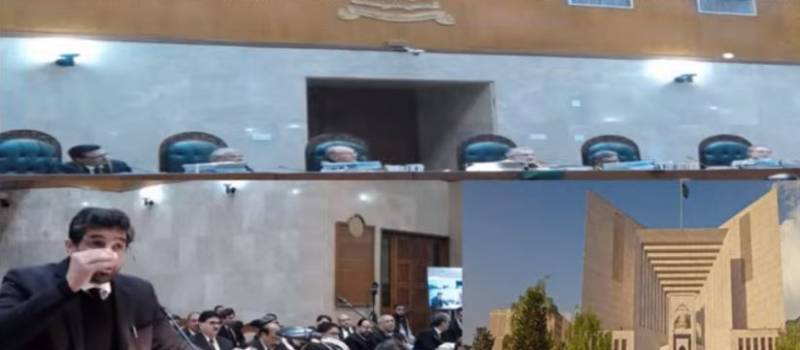Islamabad (Web Desk): The Supreme Court (SC) on Friday reserved the verdict on a set of petitions seeking to determine whether the disqualification period for a lawmaker is for lifetime or five years.
A seven-member SC larger bench, headed by Chief Justice of Pakistan (CJP) Qazi Faez Isa and comprising Justice Mansoor Ali Shah, Justice Yahya Afridi, Justice Amin Ud Din Khan, Justice Jamal Khan Mandokhail, Justice Muhammad Ali Mazhar and Justice Musarrat Hilali conducted hearing in the case.
The proceedings of the case were broadcast live on the SC’s website.
During today’s hearing, CJP Isa said that the SC would not take up individual cases related to elections but would only hear matters related to constitutional interpretation.
Following this, Jahangir Tareen's lawyer, Advocate Makhdoom Ali Khan, started his arguments.
Justice Mansoor Ali Shah questioned Makhdoom if according to him, the declaration of disqualification would come from the civil court. To this, Tareen’s counsel replied in the positive.
Justice Mazhar then asked whether Article 62(1)(f) can be implemented before the elections or even after the polls.
At this, Makhdoom Ali Khan replied that the candidate is disqualified pre-elections if we read Articles 62 and 62 together.
After this, the CJP asked that why are we limiting ourselves to only one specific part of the Constitution and disregarding the constitutional history and fundamental rights?
"Do not limit yourself and as a constitutional expert, explain to us in a broader context," the CJP told the lawyer.
Makhdoom Ali Khan implored the larger bench to overturn the Samiullah Baloch case verdict wherein the top court held that the disqualification period under Article 62(1)(F) will be for life.
During the previous hearing on Thursday, CJP Faiez Isa said that the court was seeking “clarity” on whether the disqualification period for a lawmaker was five years or a lifetime ban under the aforementioned article which deals with the criteria to contest elections.
He remarked that said that the solution to this matter is present in Islam.
“The Holy Quran mentions that the status of humans is very high,” the top judge said, referring to a verse from Surah Sajda which explains that human beings are not bad but their deeds are.
The chief justice observed that whether the wisdom of five people could abolish the legislation of 326 parliamentarians. He remarked that the lifetime disqualification was also against Islam.
He said that the legislation introduced by the elected members of the Parliament could not be seen with hate. He noted that the Article 62(1)(f) did not mention the period of disqualification.
The CJP said that the court wanted to conclude the case early in view of the general elections, and also wanted to end the confusion of returning officers with regard to the Election Act.
The Supreme Court Bar Association’s (SCBA) lawyer Ali Imran said that they were withdrawing their case. “The SCBA supports the Election Act and five-year disqualification,” he added.
During hearing, amicus curiae Aziz Bhandari Advocate, Faisal Saddiqui Advocate, Usman Kareem Advocate gave arguments.
The inconsistency between court decisions and parliamentary legislation regarding the duration of disqualification under Article 62(1)f has prompted the apex court to intervene and determine whether the disqualification of a lawmaker should be for a lifetime or five years stipulated in the Election Act.
The fate of many politicians, including Pakistan Muslim League-Nawaz (PML-N) supremo Nawaz Sharif and Istehkam-e-Pakistan Party (IPP) founder Jahangir Tareen, depends on the verdict of this case.
More to follow….


